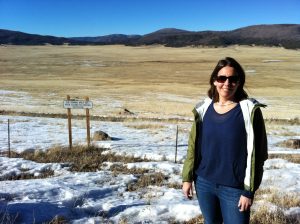(Blog) April 2016 Featured Governance Team Member
Over the coming months, the Governance Team will be  featuring team members on the blog. The first team member to be featured is Dr. Andrea Olive. Andrea is an Assistant Professor in the Departments of Political Science and Geography at University of Toronto Mississauga. She answered a few questions about her research and passion for rural.
featuring team members on the blog. The first team member to be featured is Dr. Andrea Olive. Andrea is an Assistant Professor in the Departments of Political Science and Geography at University of Toronto Mississauga. She answered a few questions about her research and passion for rural.
What is your current research?
My current research examines endangered species conservation on private lands in Southern Ontario. In the past ten years I have interviewed about 150 rural landowners in Indiana, Ohio, Utah, Saskatchewan, and Ontario. My most recent project involves assessing landowner knowledge of endangered species policy in the provinces as well as knowledge of the actual species that co-inhabit their land. In addition to interviews with landowners, I have also conducted a web-survey with Conservation Authorities and environmental interest groups. In general, I am hoping to understand why endangered species policy in the province has not been successful at fostering stewardship on private lands.
Why did you choose to study rural issues? (Why is rural important to you?)
I grew up in Saskatchewan. I am “from the city” but my grandparents had their farm while I was growing up, which I would visit often. And our family cottage is in a rural part of the province. So in many ways, I feel like I have a “rural” background – one that is only exaggerated by my now living in Toronto. The city feels foreign and I find myself pulled toward the country. Is that why I decided to study rural conservation? Not exactly. Some where between 75% and 90% of endangered species rely on private lands for survival in the US and Canada. Rural landowners are absolutely essential to the future of biodiversity. How landowners choose to manage their land is literally a life and death difference for many species. Most landowners are good stewards (or want to be), but sometimes the policy is not clear or the government creates mechanisms that seem to work against landowners (regulatory burdens). Thus, I am trying to find a way to manage a public resource on private lands in a way that respects nature, the rural landscape, and rural communities.
What are you interested in working on in the future?
I am hoping to examine the political ecology of the Bakken Formation (oil shale play in the Great Plains). While this part of North America is normally considered a “fly-over state”, North Dakota and Saskatchewan are now major oil producers. I am hoping to interview landowners to understand how they think about hydraulic fracturing when making land management decisions (trade-offs around farming, stewardship, oil & gas).
What do you see as the value of the RPLC?
The RPLC is a place to meet other scholars and share research. It is also a place to learn about exciting and important opportunities – from conferences, to funding, to research assistantships. Canada is a big place and while 81% of us live in a city, 100% have to care about rural spaces.
Recent Book Publication:
Canadian Environment in Political Context (UTP). More information and ordering details here: http://www.utppublishing.com/The-Canadian-Environment-in-Political-Context.html
You can learn more and keep up to date Canadian environmental policy at Andrea’s blog – https://canadianenvironment.wordpress.com/
Contact:
Website: http://sites.utm.utoronto.ca/politicalolive/
Email: andrea.olive@utoronto.ca
